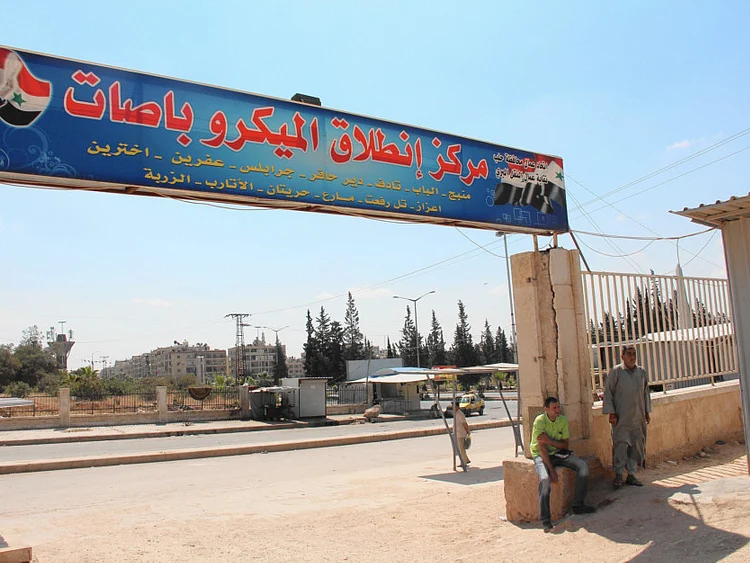Aleppo: The men arrive at the depot sucking on their cigarettes, no longer fearful that smoking in the wrong place will earn them a rendezvous with the whip, or the executioner.
The women have thrown off the shrouds that covered even their faces and walk freely, liberated of the mandate that a male relative accompany them.
This is a dusty satellite bus station, unremarkable in all outward aspects, a collection of corrugated metal and cinder-block shacks housing various transportation franchises. But the threadbare venue daily hosts a behavioral transformation as travelers cross front lines both strategic and social, military and emotional.
The depot in government-controlled Aleppo serves as a kind of decompression chamber for Syrians venturing between two worlds: the realm of hard-line Islamist militants and the secular, modern Syria that is plainly evident in this historic, deeply aggrieved, northern city.
Many commuters are arriving from towns, villages and cities under control of Daesh, the Al Qaida offshoot, and Al Nusra Front, the official Al Qaida franchise in Syria. Both groups enforce an ultra-fundamentalist interpretation of Islamic law.
The station is a place where travelers still aren’t free, but it feels that way in comparison. A place where seemingly straightforward conversations veer into the realm of the unfathomable.
“They come in here, and they are shaking, sweating, they want that smoke so bad,” says Abu Hamed, a bus station manager who, like others interviewed, asked to be identified only by a nickname for security reasons.
Abu Hamed, 45, a slim, intense man with a close-cropped black beard and in a black track suit, is a native of the town of Atarib, west of Aleppo. His younger brother, Mohammad, joined Al Nusra Front early in the rebellion, he says.
“I tried to tell him not to get involved with those guys, that they were just criminals,” says a resigned Abu Hamed, seated in one of the bus station offices, the image of President Bashar Al Assad gazing down from a wall poster. “But he wouldn’t listen.”
His brother, he says, was killed in a clash with government troops.
The scope of the calamity in what was long a stable nation has left the people of Syria in a kind of collective state of shock.
“What can you do?” asks Abu Hamed, who hears it all at the bus station. “Every family has lost at least one person. Some have lost five. That’s the story of Syria today.”
Syria is divided politically, emotionally and geographically. Vast stretches of territory are under control of militant factions, though much of the opposition-held terrain is desert. Most Syrians still live in government-controlled areas, such as the major cities of Damascus, Homs and Hama, and along the Mediterranean coast.
Aleppo, the historic and economic heart of the north, the proud, cosmopolitan metropolis that has been a trading hub for centuries, is split into government and rebel-held sectors. It is a mostly joyless place these days.
Some neighborhoods, including the historic Old City, a UNESCO World Heritage site, are divided between the government and rebels. The magnificent covered souk is charred and derelict, fighters with Kalashnikovs having supplanted shoppers and tourists. What used to be a five-minute walk between adjoining districts can now involve circuitous bus rides of 12 hours or more through army and militant checkpoints. Thirty-foot-high curtains, meant to deter the ubiquitous snipers, hang between apartment blocks.
Inevitably, some people have to cross from one side to another. They may want to visit relatives or friends, see a doctor, do a bit of shopping.
Many commuters are state employees trapped behind militant lines. Even though they can no longer work, they continue to receive their salaries, which requires a trip to the government side to pick up monthly checks.
The militants exact a tax or tithe on their salaries, as they do on all property, including cars, houses and farmed produce, residents say.
All arrivals from opposition territory are subject to searches and security screening.
Likewise, the rebels posted at opposition checkpoints conduct their own checks and impose harsh travel restrictions: Fighting-age men are generally banned from leaving insurgent territory without an airtight excuse, such as serious illness. A woman can travel only if accompanied by an adult male. And those given permission to travel must leave family members behind as collateral _ hostages, that is.
No cigarettes are allowed in Daesh territory. Those found trying to smuggle in smokes may face a dozen lashes or worse.
“I try to bring in some cigarettes in my underwear,” says Abu Ahmad, a bus driver who frequently ferries passengers to Daesh territory, including Raqqa, the Daesh bastion about five hours away.
Sign up for the Daily Briefing
Get the latest news and updates straight to your inbox
Network Links
GN StoreDownload our app
© Al Nisr Publishing LLC 2026. All rights reserved.
